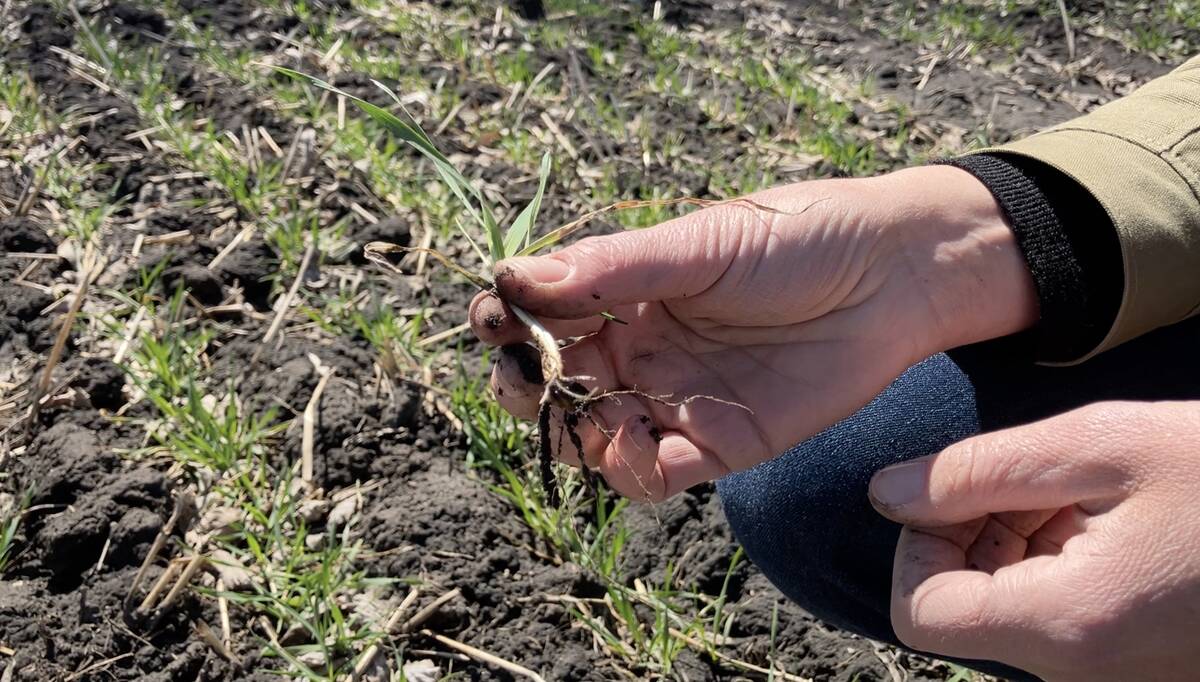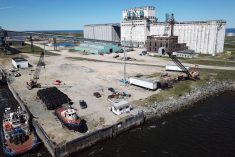A lot of people want to talk about what kind of stick Manitoba can bring to the fight if the United States imposes blanket 25 per cent tariffs on Canada. Premier Wab Kinew, meanwhile, says his government is opting for a more measured approach.
“I think the first thing that we’re focused on is this effort to make the case to the incoming administration and to Americans generally that we need to preserve and build on this really great trade relationship that we have right now,” he said.
Kinew’s comments were made to reporters following his Manitoba Ag Days 2025 address in Brandon Jan. 21, one day after U.S. President Donald Trump took office. Trump had initially promised to impose tariffs against both Mexico and Canada right after his inauguration.
Read Also

Manitoba farmers wary of research hit after AAFC cuts
Agriculture and Agri-Food Canada cuts claim Portage la Prairie research farm; Manitoba farms groups wrestle with potential impact.
As the day arrived however, reports suggested that timeline would be rolled back. Trump later said those tariffs would come into play in early February.
Why it matters: Trump tariffs were a major topic for speakers and farmer attendees alike during Manitoba Ag Days 2025.
Manitoba won’t be caught flat-footed, Kinew told Ag Days attendees.
“Lurking in the background is this simple fact: Nobody wins in a trade war between the U.S. and Canada except the Chinese Communist Party,” he said.
In December 2024, Kinew announced a Manitoba trade office based in Washington, D.C. He expects that office to open in the next few months.
There are still details to hammer out, including the physical site of the trade office. The province hopes to home the office within the Canadian embassy, which requires a lease deal with the federal government.

Manitoba Premier Wab Kinew speaks to farm show attendees after his Manitoba Ag Days address on Jan. 21, 2025, in Brandon. PHOTO: ALEXIS STOCKFORD
The other aspect, however, is how to ensure Manitoba has a presence in other key commercial areas, he said.
There have been a number of trade missions to the U.S. since Donald Trump’s November 2024 election win. States with strong existing or potential trade with Manitoba have been a focus.
Previous provincial messaging has named states such as Wisconsin, North Dakota, Pennsylvania, Illinois, Minnesota, Georgia, Tennessee and Texas for those efforts. The Manitoba Pork Council, meanwhile, has pointed to their strong relationship with Iowa.
Kinew and Canada’s other premiers are headed back to the U.S. for another trade trip Feb. 12.
“Obviously, there’s a ton of instability at the federal level in our country right now, but I can reassure you that the premiers are stepping up,” he said during his Ag Days address.
On Jan. 24, the province announced a U.S. trade council to prepare Manitoba for tariffs. That council included chambers of commerce, Keystone Agricultural Producers, labour and business groups and ag equipment manufacturers, among representatives from other sectors.
The province also tapped Gary Doer, former Manitoba premier and Canadian ambassador to the U.S., to “advise on U.S. trade,” Kinew said in a Jan. 24 release.
Manitoban strategy
During his follow up with reporters, Kinew also referenced “quick responses” being prepared should the U.S. trade relationship deteriorate or tariffs are imposed, but did not provide details.
He argued that the focus needs to be on a mix of shorter-term supports for Manitoba business and long-term preparation for the new economic normal.
“If you look at what’s happening around the world right now, a return to the status quo, of like the NAFTA free trade era of decades past, that’s not going to happen,” he said. “So what we need to do right now in this current environment is to give ourselves the time and the space to prepare our economy here in Manitoba for the way things are going to be in the decades to come.”
He also encouraged everyone in the supply chain, consumers included, to support their local economy.

Manitoba Premier Wab Kinew announces the opening of two MASC offices in Shoal Lake and Virden during Manitoba Ag Days 2025. PHOTO: ALEXIS STOCKFORD
Kinew said Manitoba’s fortunes at the trade table will be about leverage.
There are things the province has going for it, including the Port of Churchill, he said, adding that the presence of that deep sea port flies under the radar for many Americans.
“The opportunities that we have there with mining, with agriculture, with energy, with national security, it’s huge. And when we make the case to Americans, particularly with this new administration in the White House, having a strong security message is super, super important,” he said.
He pointed to provincial investments into the port, adding that the port provides market access, but also signals to the U.S. that Manitoba is interested in building supply chain resiliency.
Last February, Kinew’s government announced $60 million in federal and provincial funds for port upgrades and to revamp rail service between The Pas and Churchill. In March, the Co-operator reported that those funds brought total federal and provincial investment in the port to $293 million since 2018.
Maintaining reliable rail shipment and port operation has been a struggle since 2017, when floods took out the track. The port and rail line have since gone through ownership changes and several rounds of service disruption for repairs and upgrades.

An aerial shot of the Port of Churchill. PHOTO: FILE
When asked about trade diversification, Kinew said they’re also investing in that concept. He pointed to support for GATE, Cereals Canada’s incoming hub in downtown Winnipeg.
On internal trade barriers, Kinew said that’s been brought up with other premiers, but Manitoba leads in that space and much of the work addressing those barriers needs to come from other provinces.
“There is no replacing the United States of America as an export destination,” he said. “So for us, it’s really an ‘all of the above’ approach. Yep, we’ll work on diversifying international market access. Yeah, we’ll work on internal trade and double, triple, yeah, we’re going to lean into the U.S. trade relationship.”
Tightened security
Kinew noted security several times during his comments to reporters.
Trump has framed his threatened tariffs in the context of border security, specifically noting illegal cross-border traffic of immigrants and drugs.
Kinew’s government has made recent moves around border security. In December, the province pushed more overtime pay for RCMP border patrols and said that Manitoba conservation officers would help bolster those patrols.
That last one was not without push back. Some organizations, like the Manitoba Wildlife Federation, worried the move would deplete conservation officer capacity in the province.
Those announcements combine with federal moves from a $1.3-billion national border plan, which includes more co-ordination between law enforcement, chemical detection tools, surveillance capacity and other technology.
Residents of Manitoba border towns were told that a Black Hawk helicopter, bearing police officers able to respond to illegal border activity or guide integrated border enforcement teams to the site, would become a regular feature of their airspace. The first of those flights launched Jan. 19, according to an RCMP release.
What’s a farmer to do?
For agriculture, the stakes are high. Manitoba’s agri-exports were enjoying a growth trend as of the end of 2023. The province posted a whopping $9.39 billion in ag and agri-food exports that year. That export category was growing faster than non-ag exports. Just under half of those ag and agri-food products headed to the U.S.
With the province’s next largest export destination (China) accounting for just under 17 per cent of agri-exports, the U.S. is by far the Manitoba farm sector’s largest trading partner.

The U.S. takes more of Manitoba’s agricultural products than any other country. SOURCE: AGRI-FOOD EXPORT PERFORMANCE IN 2023/MANITOBA AGRICULTURE
“I think the worst thing about it is the uncertainty around it,” said Terry Betker, farm management consultant and principal of Backswath Management. “It’s difficult to plan when there’s uncertainty at the best of times. But when you get something as potentially disruptive as what the tariffs are potentially going to be, then it becomes really difficult.”
His advice for farmers is to run a kind of worst-case-scenario mental exercise: Imagine the worst impacts for their operation, and gauge how that scenario will reflect on their finances.
The idea is to “understand how much liquidity, how much cash flow — surplus cash flow —they have. And then in that worst-case scenario, determine … the impact of the potential tariffs on that and plan on that basis.”
Industry making moves
No one’s even sure if tariffs will materialize in early February, said Cam Dahl, general manager of the Manitoba Pork Council.
The pork council has launched their own trade envoys to key trading states. When he spoke to the Co-operator, Dahl was on one such trip to Iowa, a state that takes about 2 million live pigs from Manitoba each year.
The pork council has also opted for conversation and allyship with key trading partners as the best way to protect their sector’s trade.
“That’s still something that we’re working towards … working with our allies in the U.S., because their voice is, of course, much more powerful in Washington, than ours,” Dahl said.
Manitoba’s beef sector is doing much the same.
“Even from as early as mid- to late-last summer, when the potential writing was on the wall, we were working on keeping those relationships as open and as strong as possible with our U.S. counterparts and with the U.S. state representatives and state associations,” Manitoba Beef Producers president Matthew Atkinson said.
The cattle sector has also commissioned studies on potential tariff impacts and other markets they could pursue, he added.
Farmers speak on the plan
In December, Dahl had praised news of Manitoba’s Washington trade office.
The pork sector had noted growing protectionism with their trade partners and had pushed for more national co-ordination, and a robust agricultural trade strategy coming into the review of the CUSMA free trade deal, but wasn’t seeing the action from Ottawa they would have preferred, Dahl said at that time. If the provinces wanted to provide that leadership, that was a win in Dahl’s book.
His sentiments remain much the same, he said Jan. 23.
He is hopeful that the various outreach efforts, both governmental and from industry, will bear fruit.
“I think it will make a difference,” he said. “You know, how much of a difference? All of that is still uncertain.”
The province’s canola growers, meanwhile, pointed to meetings set up between the province, the Manitoba Canola Growers Association and other stakeholders to get farmer perspective on potential tariff impacts.
“We appreciated the opportunity to have a proactive and open dialogue around this topic and MCGA looks forward to staying engaged with the provincial government as this issue evolves,” MCGA executive director Delaney Ross Burtnack said via email.
Atkinson also cited those meetings.
“I’ll give the provincial government credit,” he said. “They brought a bunch of us in the ag sector together for a discussion with all the different commodities and different folks involved, like trucking associations. (They) brought us together to talk about our approach and impacts. That’s really appreciated.”
— With files from Miranda Leybourne, Gord Gilmour and Don Norman
















